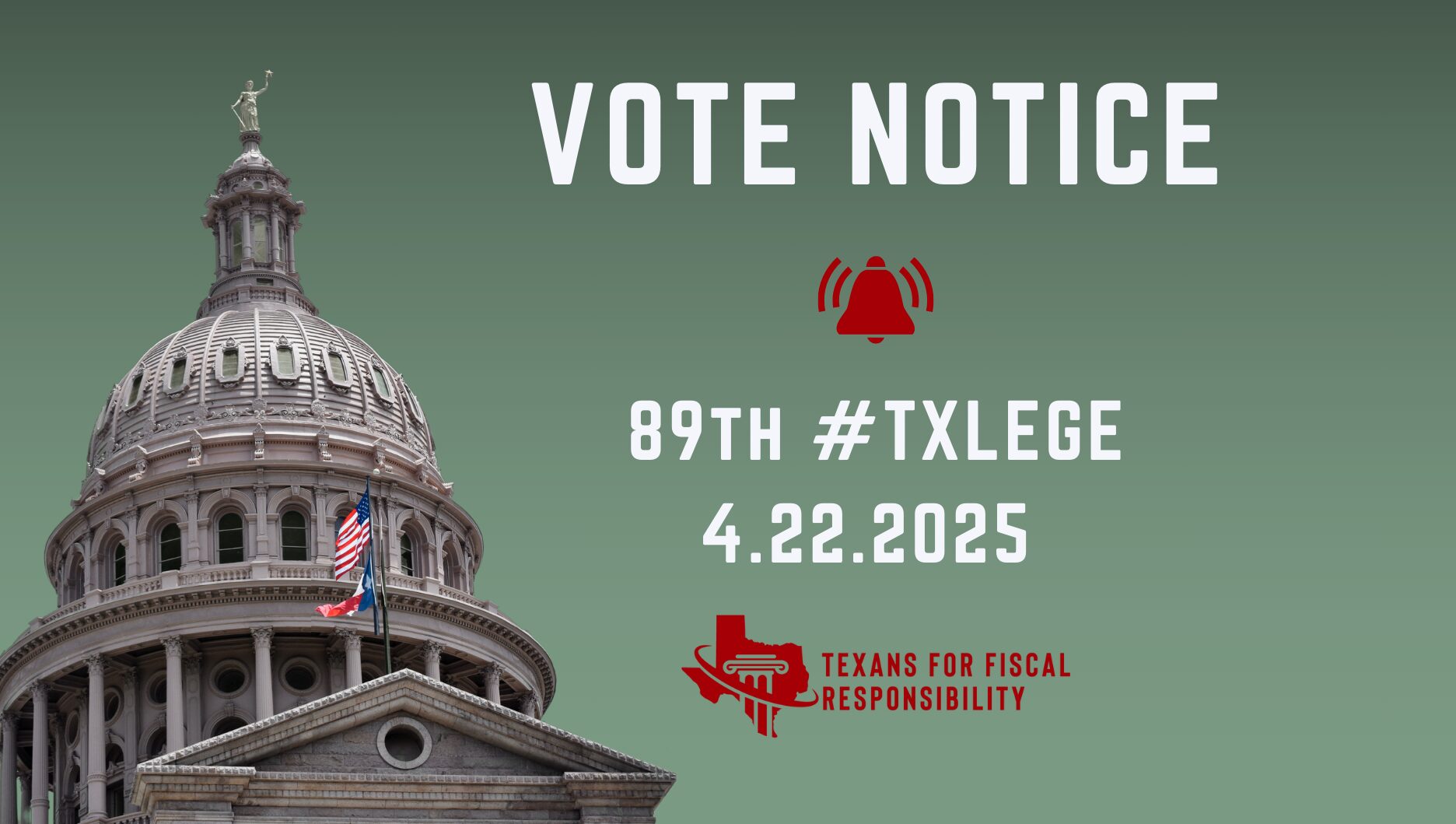
Texans for Fiscal Responsibility has issued the following vote notice for April 22nd, 2025
Texas House of Representatives
Subject: House Bill 18 (HB 18) – Expands rural hospital grants and bureaucracy
- Author: State Rep. Gary VanDeaver (R-New Boston)
- Caption: Relating to the establishment and administration of certain programs and services providing health care services to rural counties.
- TFR Position: OPPOSE
- Background:
- HB 18 creates new government programs to prop up rural hospitals with taxpayer-funded grants, training, and administrative offices. It sets up four overlapping grant programs—financial, emergency, innovation, and support—without any guarantee of long-term sustainability. The bill also opens the door to ongoing Medicaid payment increases and new reimbursement mandates, all while bypassing standard fiscal oversight procedures. With an initial cost of nearly $50 million over two years and tens of millions of dollars each year thereafter, this bill represents a sizable expansion of government with no concrete metrics for success. It does not address the structural inefficiencies or overregulation that contribute to rural hospital struggles. While supporting rural access to care is important, this bill increases bureaucracy and taxpayer liability without guaranteeing better outcomes. The focus should rather be on deregulation and market-based reforms—not growing government through grants and mandates.
Subject: House Bill 121 (HB 121) – TEA peace officers
- Author: State Rep. Ken King (R-Canadian)
- Caption: Relating to measures for ensuring public school safety, including the commissioning of peace officers by the Texas Education Agency, the composition of the board of directors of the Texas School Safety Center, and public school safety and security requirements and resources.
- TFR Position: OPPOSE / AMEND
- Background:
- HB 121, the companion to SB 1262, includes many well-intentioned school safety provisions, however, the most concerning aspect is that it grants the Texas Education Agency the authority to commission peace officers. This blurs the line between education oversight and direct law enforcement, introducing a new layer of state-level policing that duplicates local efforts. It sets a dangerous precedent of expanding a regulatory agency’s power, centralizing more law enforcement functions in unelected bureaucracies. While enhanced safety audits, planning and resources are quite laudable, the state’s focus should remain on supporting local districts rather than creating a TEA police force. Fiscally, this could open the door to future funding obligations for a new TEA enforcement division, diverting taxpayer dollars from core educational priorities. For these reasons, TFR opposes HB 121 unless the TEA peace officer commissioning authority is removed, or substantially limited in their authority and scope.
Subject: House Bill 3700 (HB 3700) – DOGE the TWC
- Author: State Rep. Hubert Vo (D-Houston)
- Caption: Relating to the prevention, detection, and investigation of fraud, waste, and abuse in programs administered by the Texas Workforce Commission or by the commission’s contractors or grantees.
- TFR Position: SUPPORT
- Background:
- HB 3700 requires the Texas Workforce Commission (TWC) to create a formal process to detect and prevent fraud, waste, and abuse in all its programs, including those managed by outside contractors or grant recipients. The agency must build systems to identify suspicious activity and ensure a streamlined method for the public and stakeholders to report such issues—especially via an online reporting system. This reform fills a current gap, as only a few TWC programs had statutory anti-fraud requirements. This bill strengthens oversight and accountability without creating new bureaucracy or expanding government scope. By proactively addressing waste and inefficiencies, it safeguards taxpayer dollars and improves program integrity.
Subject: House Bill 1846 (HB 1846) – EV truck planning council
- Author: State Rep. Armando Walle (D-Houston)
- Caption: Relating to the establishment of the Electric Truck Advisory Council.
- TFR Position: OPPOSE
- Background:
- HB 1846 creates a new state advisory council to plan and promote electric truck charging infrastructure across Texas. It mandates participation from multiple state agencies and private sector representatives to map out charging locations, regulatory needs, and policy suggestions. The council would meet monthly and deliver a strategic plan by 2027, triggering additional planning responsibilities for state agencies. Over the next five years, taxpayers would fund this effort to the tune of more than $6.7 million. This bill grows government unnecessarily. The electric vehicle and freight industries are already advancing charging technology and infrastructure on their own through private investment and innovation. There is no compelling reason for taxpayers to foot the bill for an industry that is already incentivized by market demand. For this reason, TFR opposes HB 1846.
Subject: House Bill 1442 (HB 1442) – Government meeting transparency
- Author: State Rep. Donna Howard (D-Austin)
- Caption: Relating to the Internet broadcast or recording of certain open meetings.
- TFR Position: SUPPORT
- Background:
- HB 1442 boosts transparency by requiring state agencies to publicly broadcast their meetings online. Larger executive agencies—those with over $10 million in state funds and 100+ employees—must livestream meetings and post video/audio recordings on their websites for at least two years. Other executive and all legislative agencies must also share recordings within seven days, either on their site or social media. These steps allow taxpayers and watchdogs to hold agencies more accountable without needing to physically attend meetings. No new regulatory authority is created. It helps to ensure state funds are being used transparently. This is common sense, pro-taxpayer reform bill that empowers citizens without growing bureaucracy or spending.
Subject: House Bill 1147 (HB 1147) – Government-run soft skills course
- Author: State Rep. Erin Gámez (D-Brownsville)
- Caption: Relating to the establishment by the Texas Workforce Commission of a workplace soft skills training pilot program.
- TFR Position: OPPOSE
- Background:
- HB 1147 directs the Texas Workforce Commission to run a six-week training program in Cameron County to teach soft skills like time management and communication. This bill creates a new government program with taxpayer dollars—duplicating efforts already addressed by private employers, non-profits, and community colleges. It risks setting a precedent for permanent government involvement in areas best handled by families, educators, and businesses. The bill also opens the door to a statewide expansion, meaning this could grow into a recurring expense without real accountability. A more fiscally responsible approach would let the free market continue to provide job readiness skills, rather than expanding government training programs. Taxpayer funds should be prioritized for reducing the size and scope of government, not expanding it.
Subject: House Bill 1154 (HB 1154) – Workforce planning task force
- Author: State Rep. Erin Gámez (D-Brownsville)
- Caption: Relating to the establishment of a skilled labor task force by certain local workforce development boards.
- TFR Position: OPPOSE
- Background:
- HB 1154 mandates that the workforce board in Cameron County create a large, government-run task force to study and report on local workforce issues. While well-intentioned, the bill expands bureaucracy and creates an unelected panel of 17 members, including political appointees and government insiders, to produce periodic reports that may or may not lead to measurable outcomes. This structure duplicates efforts already underway in the private sector, where businesses and schools are collaborating to meet labor needs without additional mandates. It also places additional administrative burdens on the local workforce board, potentially redirecting resources from direct job training to government planning.
Subject: House Bill 1971 (HB 1971) – Eases geothermal regulation burden
- Author: State Rep. Drew Darby (R-San Angelo)
- Caption: Relating to an exemption for drillers or operators of closed-loop geothermal injection wells from certain requirements applicable to persons involved in activities under the jurisdiction of the Railroad Commission of Texas.
- TFR Position: SUPPORT
- Background:
- HB 1971 removes unnecessary red tape for Texas landowners who use closed-loop geothermal wells to heat and cool their homes. These systems are environmentally friendly and self-contained, posing minimal risk and not producing hydrocarbons. By exempting these homeowners from bureaucratic reporting and permit fees, the bill keeps government regulation limited in scope. It ensures that residential property owners aren’t treated like commercial oil and gas operators. This reform reflects a practical approach to regulation—one that respects private property rights and reduces costs for families. It also limits government expansion by narrowing the Railroad Commission’s reach. HB 1971 protects individual liberty, avoids wasteful regulation, and supports energy innovation led by private citizens.
Subject: House Bill 484 (HB 484) – University tobacco ban authority
- Author: State Rep. Suleman Lalani (D-Sugar Land)
- Caption: Relating to the use of cigarettes, e-cigarettes, and tobacco products on the campus of a public institution of higher education.
- TFR Position: OPPOSE
- Background:
- HB 484 allows Texas public colleges and universities to create blanket bans on smoking, vaping, and using tobacco products anywhere on their campuses. While not mandatory, it gives these government-run institutions the power to restrict lawful behavior by adults. This opens the door for overreach and unnecessary control of personal conduct. The bill does nothing to reduce spending, cut taxes, or protect individual freedoms—rather it does the opposite. The free market has already driven awareness about the potential risks of tobacco use, and innovation in tobacco alternatives, without heavy-handed government mandates. Granting public universities unilateral authority to police non-criminal conduct undermines liberty and sets a troubling precedent.
Subject: House Bill 685 (HB 685) – Stops unfair utility rate discrimination
- Author: State Rep. Cecil Bell Jr (R-Magnolia)
- Caption: Relating to rates established by municipalities for water or sewer service for certain entities.
- TFR Position: SUPPORT
- Background:
- HB 685 protects tax-exempt entities, like churches and nonprofits, from being unfairly charged higher water or sewer rates simply because they do not pay certain taxes. Some cities have used utility fees as a backdoor tax to target these groups, sidestepping their exempt status. HB 685 closes this loophole by requiring municipalities to charge the same utility rates to tax-exempt and non-exempt customers when they receive comparable service. This promotes consistency, and prevents local governments from using creative methods to extract extra revenue.
Subject: House Bill 3125 (HB 3125) – Government-run geothermal job training
- Author: State Rep. R.D. Guerra (D-Mission)
- Caption: Relating to establishment by the Texas Workforce Commission of a geothermal energy workforce education and training initiative.
- TFR Position: OPPOSE
- Background:
- HB 3125 creates a new government-run training program aimed at preparing workers for jobs in the geothermal energy industry. It tasks the Texas Workforce Commission with designing educational curriculums and credential programs in collaboration with colleges and industry players. This effort would be supported by tapping into existing state workforce funds and encouraging public-private partnerships for job placement. While marketed as preparing for future energy jobs, this bill is another example of government expanding its footprint into a niche sector already innovating on its own through market forces. Rather than allowing private industry to respond to labor needs organically, the bill grows government and inserts state agencies and funding into a space that could be better handled by employers and vocational institutions without legislative mandates.
Subject: House Bill 3077 (HB 3077) – Streamlines alcohol sales reporting
- Author: State Rep. Charlie Geren (R-Fort Worth)
- Caption: Relating to reports by certain persons involved in the manufacture and distribution of alcoholic beverages for purposes of sales and use taxes.
- TFR Position: SUPPORT
- Background:
- HB 3077 simplifies government reporting requirements for alcohol producers and distributors by removing the outdated mandate to list universal product codes (UPCs) on monthly sales reports. Many small brewers do not use UPCs, and having to fabricate or manage irrelevant codes adds unnecessary cost and complexity. This bill eliminates bureaucratic overreach and supports small businesses by cutting red tape. It allows entrepreneurs to focus on their products and customers rather than navigating pointless paperwork and regulations. Overall, the bill promotes efficient governance, protects small businesses, and reinforces limited government principles.
Texas Senate
Subject: Senate Bill 619 (SB 619) – Protects healthcare provider conscience rights
- Author: State Sen. Kevin Sparks (R-Midland)
- Caption: Relating to protection of persons from participation in a health care service for reasons of conscience; providing a civil remedy; authorizing disciplinary action.
- TFR Position: SUPPORT
- Background:
- SB 619 strengthens individual rights by protecting healthcare professionals from being forced to participate in procedures that violate their conscience. It ensures that medical staff can object to non-emergency services without risking their careers or licenses, safeguarding personal liberty in the workplace. Importantly, the bill includes safeguards so patients can still receive the care they need, without unnecessary government mandates forcing referrals or participation. It prevents state licensing boards and public institutions from punishing providers for declining morally objectionable procedures. By limiting the government’s role in dictating how private individuals and institutions must act in morally sensitive situations, this bill upholds the principles of limited government. It also helps reduce legal liability and regulatory burden on institutions trying to balance ethics and patient care. The bill promotes individual freedom, reduces potential legal conflicts, and ensures healthcare decisions stay in the hands of patients and providers—not bureaucrats.
Subject: Senate Bill 801 (SB 801) – Free birth certificates at taxpayer expense
- Author: State Sen. José Menéndez (D-San Antonio)
- Caption: Relating to the issuance of a certified birth record to a homeless individual.
- TFR Position: OPPOSE
- Background:
- SB 801 requires Texas to issue free certified birth certificates to individuals identified as homeless, and bars the state from asking for a physical address as part of the application. It creates new administrative duties for the Health and Human Services Commission, which must develop a system to verify someone’s homelessness status. While well-intentioned, the bill creates an open-ended benefit that could be difficult to administer without fraud or misuse. It also shifts the cost burden to taxpayers without any guardrails or offsetting savings elsewhere in the budget. Granting government documents at no cost sets a concerning precedent of exempting certain groups from fees everyone else must pay, eroding fairness in state services. Furthermore, this approach expands bureaucracy instead of encouraging civil society or private nonprofits to help vulnerable populations.
Subject: Senate Bill 1065 (SB 1065) – Enforces state firearm carry laws
- Author: State Sen. Bob Hall (R-Edgewood)
- Caption: Relating to a required provision in certain governmental entity contracts regarding the carrying of handguns by license holders; providing civil penalties.
- TFR Position: SUPPORT
- Background:
- SB 1065 protects the rights of lawful handgun owners by ensuring that government contractors cannot override state law and impose their own gun bans on public property. When a private group uses public land—like at the State Fair—it should not be allowed to create inconsistent rules that sidestep laws passed by the Legislature. S.B. 1065 reinforces the principle that public property must remain subject to public law. It provides a clear process to hold violators accountable, giving residents the power to report abuse and ensuring that the Attorney General can act quickly. Penalties discourage future violations and the funds collected go toward helping crime victims. This bill reduces confusion and prevents arbitrary enforcement. The bill stops unelected contractors from making rules that restrict citizens’ rights. It’s a straightforward way to protect both public access and constitutional freedoms without growing government bureaucracy.
Subject: Senate Bill 1257 (SB 1257) – Reverse Gender Transition Coverage
- Author: State Sen. Bryan Hughes (R-Mineola)
- Caption: Relating to required health benefit plan coverage for gender transition adverse effects and reversals.
- TFR Position: SUPPORT
- Background:
- SB 1257 ensures that if a health plan covered a person’s gender transition treatment, it must also cover the aftermath—whether it’s medical complications, regret-driven reversal procedures, or ongoing health screenings. This bill helps prevent taxpayers and private individuals from footing large medical bills out-of-pocket due to insurers shirking responsibility. It closes a loophole that left some Texans without coverage for post-transition care, which can be medically necessary and costly. By requiring insurance plans—not the state or taxpayers—to cover these expenses, the bill protects both individual health and public finances. It also helps improve long-term cost forecasting by requiring diagnostic codes for these treatments. SB 1257 represents a step toward personal responsibility in healthcare and avoids the expansion of government programs or subsidies to fill these gaps in care.
Subject: Senate Bill 1643 (SB 1643) – Restricts insurer rate flexibility
- Author: State Sen. Charles Schwertner (R-Georgetown)
- Caption: Relating to prior approval of certain property and casualty insurance rate increases or decreases.
- TFR Position: OPPOSE
- Background:
- SB 1643 imposes tighter state control over insurance rate adjustments by requiring prior approval for any increase or decrease over 10%. While marketed as consumer protection, the bill adds regulatory red tape that may hinder insurers from reacting quickly to market shifts or inflationary pressures. Increased oversight risks delaying rate adjustments and may lead to higher administrative costs that ultimately get passed on to policyholders. This bill also sets arbitrary limits on how much insurers can adjust rates in the future, even after initial approval. A free market approach that encourages competition, not state micromanagement, is the best way to keep rates fair. From a taxpayer standpoint, more regulation means more government involvement, with little assurance of better outcomes. The bill appears to be a solution in search of a problem—and one that could backfire on consumers and insurers alike.
Subject: Senate Bill 1883 (SB 1883) – Limits unchecked local impact fees
- Author: State Sen. Paul Bettencourt (R-Houston)
- Caption: Relating to the approval of land use assumptions, capital improvement plans, and impact fees.
- TFR Position: SUPPORT
- Background:
- SB 1883 reins in local governments’ ability to impose and increase development impact fees by mandating more transparency, oversight, and public input. The bill ensures taxpayers and property owners are given at least 60 days to review land use and infrastructure plans before any hearings take place. It also raises the voting threshold to impose fees, helping to prevent hasty, narrow-margin decisions that drive up housing and development costs. By blocking fee hikes for three years and requiring independent financial audits, SB 1883 introduces real fiscal accountability. These changes protect taxpayers from unjustified cost burdens and limit local governments from using fees as a revenue tool without scrutiny. Requiring advisory committees to include a majority of private-sector members ensures that fee-setting is not dominated by government interests. This bill helps check local government growth, supports housing affordability, and strengthens the public’s right to review how infrastructure costs are determined and charged.
Subject: Senate Bill 2018 (SB 2018) – Family-focused tax credits
- Author: State Sen. Angela Paxton (R-McKinney)
- Caption: Relating to the strong families credit against certain taxes for entities that contribute to certain organizations.
- TFR Position: SUPPORT
- Background:
- SB 2018 incentivizes private businesses to invest in nonprofit groups that support at-risk families by offering them tax credits for their charitable contributions. Rather than expanding government programs, the bill empowers civil society organizations that are already doing effective work without growing the bureaucracy. The credit is capped at $10 million total, ensuring limited exposure to the state budget while encouraging targeted private giving. It also places strict rules on which nonprofits qualify—excluding those tied to abortion services or overly reliant on government funds—ensuring funds go to independent, community-rooted organizations. Administrative costs are capped at 5%, maximizing the impact of each dollar donated. By leveraging the private sector’s resources and avoiding the creation of new state-run programs, this bill aligns with the principles of limited government and responsible spending. Though it results in some short-term revenue reduction, it offsets long-term taxpayer burdens by reducing the need for new public welfare initiatives.
Subject: Senate Bill 2743 (SB 2743) – Election law enforcement
- Author: State Sen. Brent Hagenbuch (R-Denton)
- Caption: Relating to the prosecution of certain election offenses.
- TFR Position: SUPPORT
- Background:
- SB 2743 creates a path for Texas residents to hold local prosecutors accountable if they refuse to enforce election laws. The bill allows residents to petition a judge to disqualify a district or county attorney who consistently declines to prosecute election-related offenses. If the judge agrees, the case is handed over to the Attorney General, who takes over prosecution duties without additional state funding. This ensures that no part of Texas becomes a safe haven for ignoring election laws simply because of a local prosecutor’s preferences. This empowers taxpayers to act when local officials won’t. The bill promotes uniform enforcement of existing laws without expanding government bureaucracy or requiring new spending.
Reminder: Vote Notices are provided to both Texas state lawmakers and the general public, sharing Texans for Fiscal Responsibility’s position on issues to be rated as a part of the Fiscal Responsibility Index. Notices are provided prior to votes being taken in each legislative chamber.
Disclaimer: We reserve the right to consider amendments to legislation that may be introduced without notice as a part of issues to be rated on the Fiscal Responsibility Index. We will make every effort to provide notice on amendments that are pre-filed.




